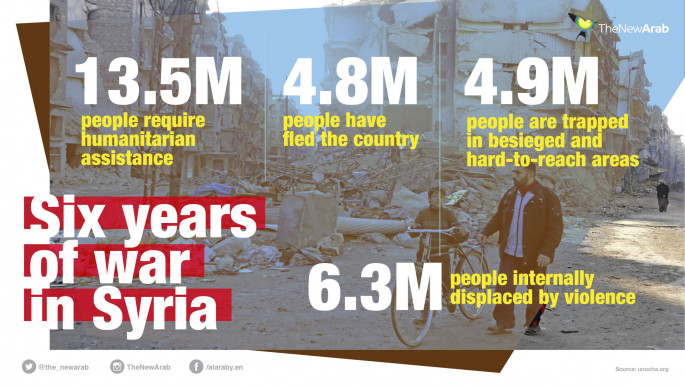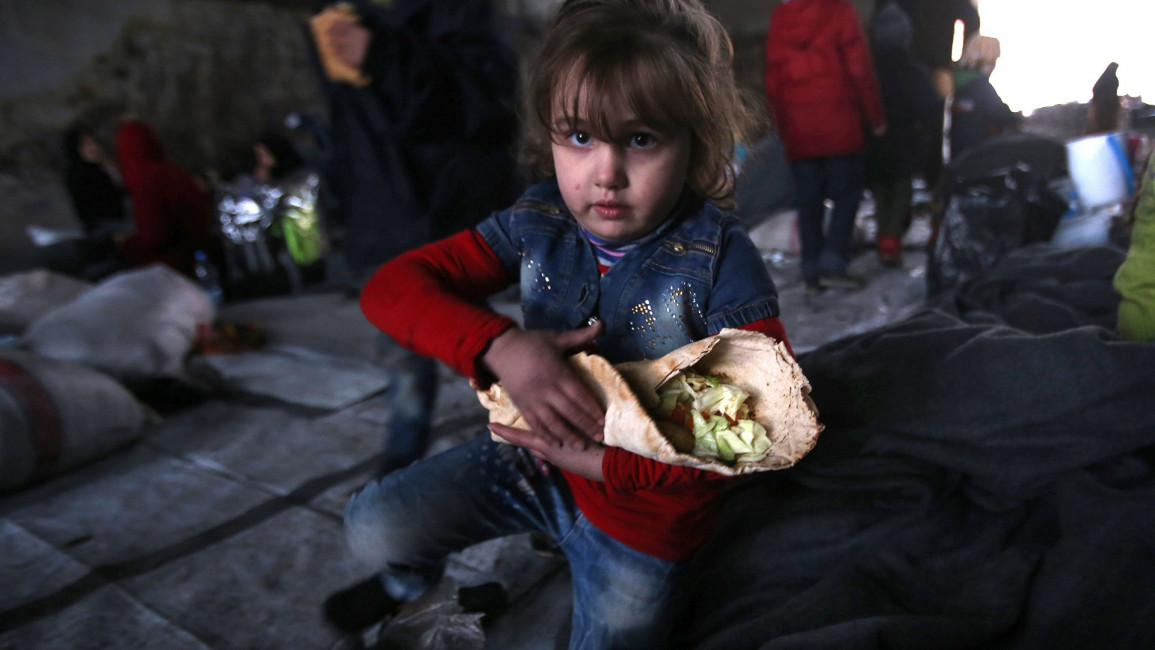Syria regime ‘slaughtering people in besieged areas in slow-motion'
The Syrian government committed “slow-motion slaughter” of unknown numbers of Syrians trapped in besieged and hard-to-reach areas by willfully denying them food and health care, according to a new report Tuesday from a civil rights group.
Physicians for Human Rights says in the report that the Syrian government consistently exploited a new UN aid delivery system, depriving millions of Syrians unable to leave their towns and cities of critically needed food and medicine. The group called that a war crime.
Officials in Damascus declined to comment.
The New York-based advocacy group said a new two-step approval process for aid convoys that Syrian and UN officials agreed to in April 2016 “fell abysmally short” of its aim of ensuring access to all Syrians in need because the government in Damascus retained “unilateral authority” over who received assistance.
 |
| [Click to enlarge] |
Besides the unknown numbers of Syrians that have starved to death, Physicians for Human Rights said many others suffered avoidable deaths because military forces striptped medical supplies from aid convoys that did manage to enter besieged and hard-to-reach areas.
“Still others bleed to death from war-related injuries — or die in childbirth, or from other preventable causes — because their besiegers refuse to allow the sick and injured to be evacuated to medical care,” the rights group said.
The report called on the United Nations to carry out deliveries to the most difficult areas without prior government approval, and to document and quickly report attempts to restrict or block convoys. And it called on the Syrian government not to block, restrict or delay aid convoys.
 |
MSF said on Monday that all parties, and especially the Syrian government and the Islamic State group, needed to allow medical assistance to reach victims of the conflict |  |
Medical siege
The international medical relief organisation Doctors Without Borders, also known by its French acronym MSF, issued a similar appeal. It said on Monday that all parties, and especially the Syrian government and the Islamic State group, needed to allow medical assistance to reach victims of the conflict.
|
|
|
|
PHR cited data from the UN Office for the Coordination of Humanitarian Affairs saying that by early December 2016, 4.9 million Syrians lived in besieged and hard-to-reach areas, “including about 975,000 under active siege, most of them — about 850,000 — by Syrian government forces.”
In 2015, UN agencies completed 32 convoy deliveries to just 620,500 people in besieged and hard-to-reach areas.
Physicians for Human Rights analysed the UN data from OCHA for 2016 and reported that the number of aid convoys to those areas increased significantly to 131 — but it said “the increased deliveries were vastly insufficient to meeting rapidly growing needs across the country.”
Only 24 percent of the people living in besieged and hard-to-reach areas received aid between May and December, after the two-step process took effect, it said.
One factor, the report said, was the Syrian government’s rejection from May through December of access to one-third of the people in besieged and hard-to-reach areas that the U.N. sought to help, which left, on average, nearly 340,000 people without aid every month, “many for months on end.”
While the government approved aid to two-thirds of the areas requested from May through December, Physicians for Human Rights said UN convoys only reach 38 percent of the approved population.
“On average, UN agencies were unable to deliver aid to more than 500,000 people for whom Syrian authorities had approved access each month during this time period,” the report said.
The data analysis showed that on average the UN actually reached a decreasing number of people each month in 2016.
“Thus, the increased approval rates throughout 2016 were meaningless at best, as they failed to produce increased aid deliveries,” the report said. “At worst, this pattern reflects an effort by Syrian authorities to appear cooperative while still ensuring that access to besieged areas remained blocked.”
 |
The Syrian conflict began six years ago when the Baath regime, in power since 1963 and led by President Bashar al-Assad, responded with military force to peaceful protests demanding democratic reforms |  |
Six years of war
The Syrian conflict began six years ago when the Baath regime, in power since 1963 and led by President Bashar al-Assad, responded with military force to peaceful protests demanding democratic reforms.
This took place during the Arab Spring wave of uprisings, triggering an armed rebellion fueled by mass defections from the Syrian army.
According to independent monitors, hundreds of thousands of civilians have been killed in the war, mostly by the regime and its powerful allies, and millions have been displaced both inside and outside of Syria.
The brutal tactics pursued mainly by the regime, which have included the use of chemical weapons, sieges, mass executions and torture against civilians have led to war crimes investigations.



